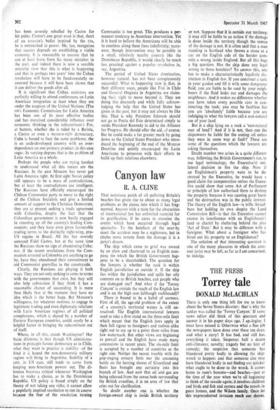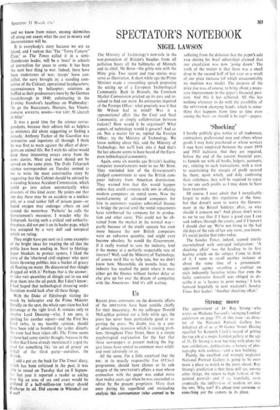Torrey tale
THE PRESS DONALD McLACHLAN
There is only one thing left for me to know about the Seven Stones disaster: that is why the
tanker was called the 'Torrey Canyon.' If sonic news editor did think of this question and answer it in his paper days ago, I apologise; I must have missed it. Otherwise what a fine job the newspapers have done over these ten days; and what a story! It has had, and still has, everything it takes. Suspense; half a dozen anti-climaxes; novelty; tragedy but no hint of comedy; the suspicion that someone has blundered pretty badly in allowing the ship- wreck to happen; and that someone else may have blundered badly in not finding out quicker what ought to be done to the wreck. It comes home to men's bosoms—and beaches—just at the time of the year when we're all beginning to think of the seaside again; it involves children and birds and fish and oysters and the towels in guest houses, and the Wilson family. Once let this unprecedented invasion reach our shores,
and we know from minor, unsung skirmishes all along our coasts what the cost in misery and inconvenience will be.
It is everybody's story because we are an island, and I reckon that 'The "Torry Canyon" Case,' as The Times called it in a semi- thunderous leader, will be a 'must' in schools of journalism for years to come. It has been the next best thing to war. Indeed, there have been undertones of war; troops' leave can- celled, the navy brought in; a standing com-
mittee of the Cabinet; operational headquarters; reconnaissance by helicopter; ministers as baffled as their predecessors were by the German breakthrough in 1940; culminating in the Evening Standard's headlines on Wednesday : `In go the Buccaneers, Hunters, Sea Vixens; NAPALM, ROCKETS, BOMBS-THE LOT; 56 aircraft in blitz.'
It was a good time for the science corres- pondents, because their editors felt as helpless as ministers did about suggesting or finding a remedy. Anthony Tucker of the Guardian was instructive and ingenious all through. I think he was first to warn against the effect of deter- gents on animal life. But I wish his editor would keep these interesting essays away from the news stories. Meat and sweet should not be
served on the same plate. The Daily Telegraph science correspondent on Tuesday seemed to
me to write the most constructive story by suggesting that the Cabinet should be advised by a standing Science Accident Commission, which could go into action automatically when disasters of this kind occur. He points out that one day there may be an accident in a nuclear pile, or a road tanker full of poison gases—or liquid oxygen may endanger others on and around the motorway. 'Pathetic' he calls the
Government's measures. I wonder why the Telegraph, having such a critical and authorita- tive piece, did not put it on its leader page, which was occupied by a very dull and untopical article on rating.
They might have put next to it some examples of the bright ideas for treating the oil that the public have been sending in. Next to blotting- paper blankets to protect oysters, I liked the story of the 'chartered civil engineer who spent hours throwing pebbles into a bucket of greasy oil floating on water. He discovered that shingle dragged oil with it.' Perhaps that is the answer: to take vast quantities of shingle out to sea and drop them into the oil patch. But I don't know: I had hoped that technological planning under Socialism would look after all these things.
With the Duke of Edinburgh visiting the wreck by helicopter and the Prime Minister literally on the spot, the whole operation has had patronage at the right level. It remains only to involve Lord Denning—who, I am sure, is spoiling for another report—and the First Sea Lord (who, in my humble opinion, should have been told to bombard the tanker directly
the crew had been taken off). The Times seems
to have had some similar thought, because in the leader that I have already mentioned it urged the need for something like 'an act of piracy' on behalf of the third party—ourselves, the British.
I add a pat on the back for The Times' diary, Which has been criticised in the past; it was able to reveal on Tuesday that on 8 Septem- ber ast year it reported a reader as asking how big an area of sea and coast would be polluted if a half-million-ton tanker should discharge its oil. Did anyone in Whitehall cut it out?































 Previous page
Previous page